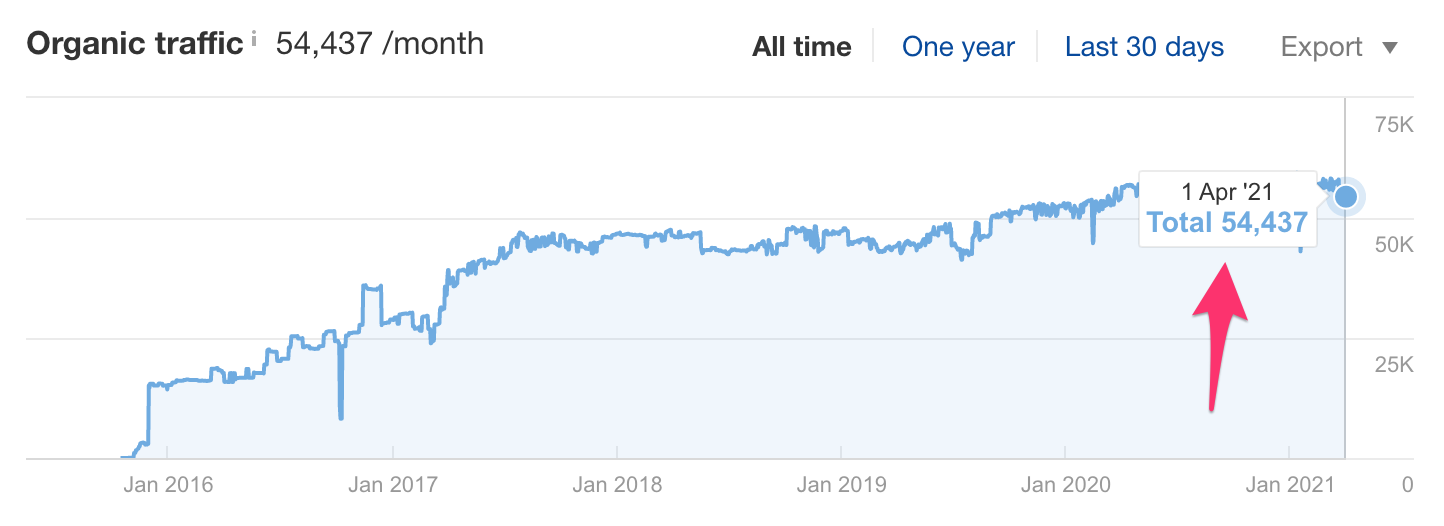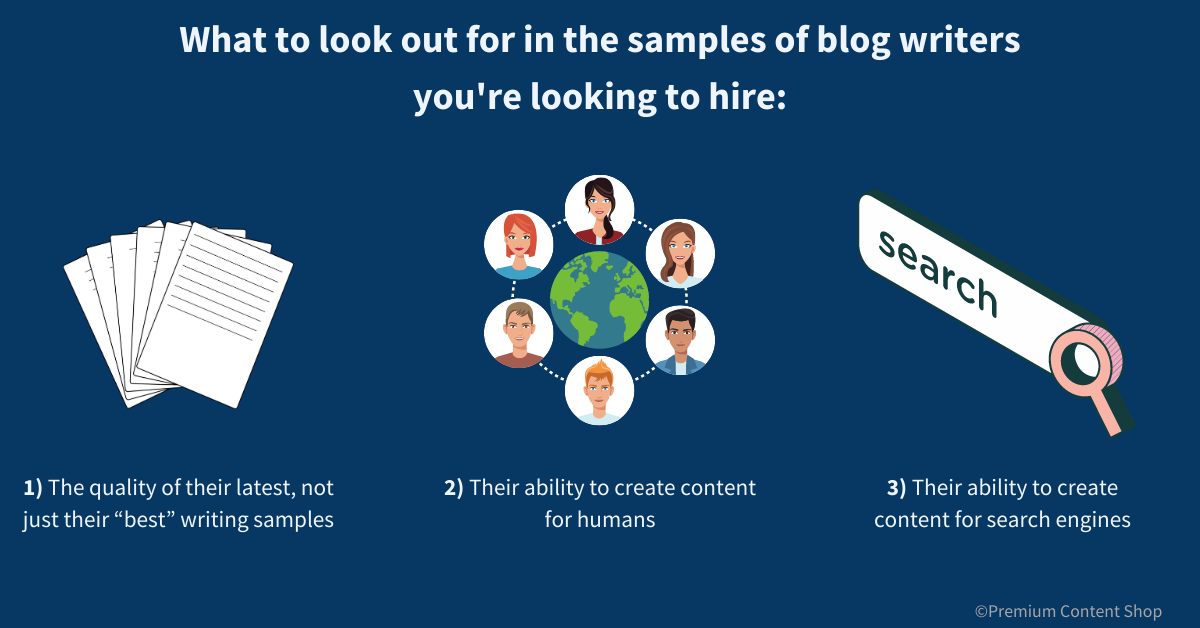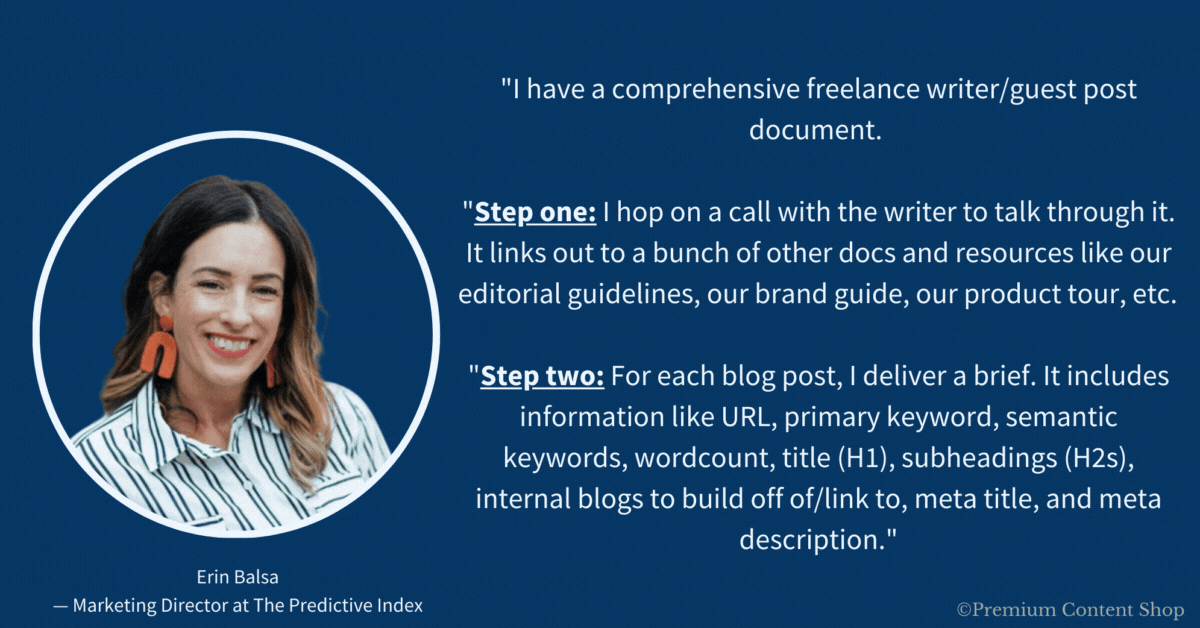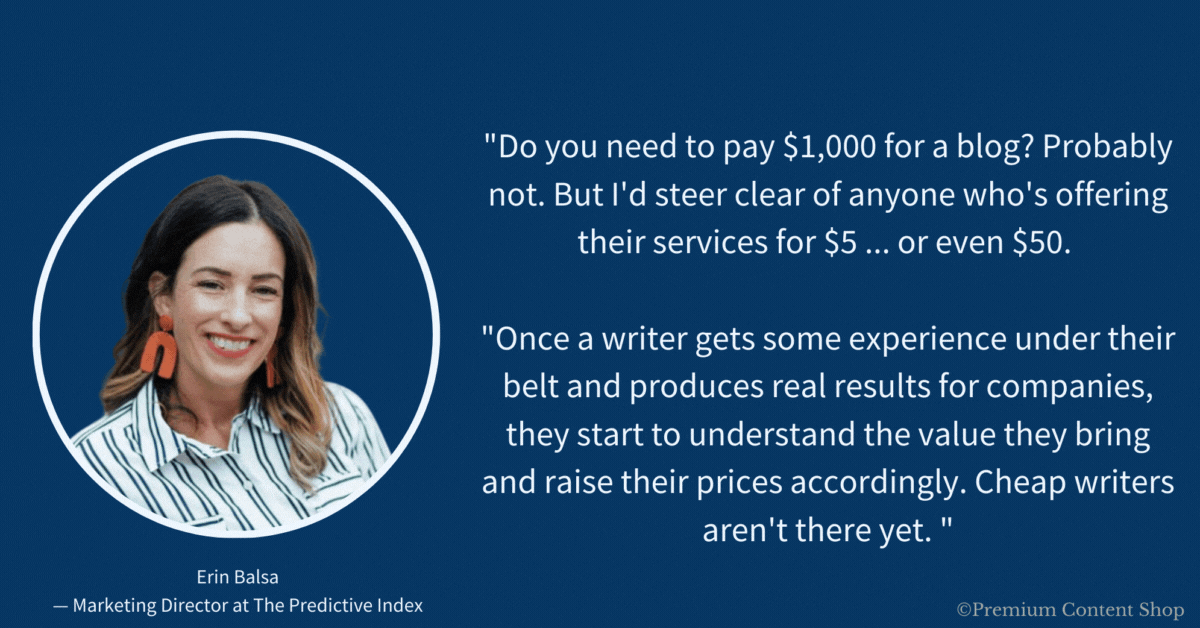We just spent about three weeks looking for blog writers.
(For clarification: by “we,” I mean my managing editor — Rennie — and myself, Victor.)
During those three weeks, we went through a long, frustrating hiring process.
And the problem wasn’t finding writers; you’d agree there’s no shortage of writers out there.
The problem was finding writers who could uphold the quality standards we have for the content we’re creating (for our clients and our business).
It was almost an uphill battle.
But we had to keep looking — because the stakes were high.
Our customer retention, as a content marketing shop, depends a lot on the quality of content we produce for clients. (And, shameless plug here: We do great work for them. Here’s one testimonial we recently got — the client shared it unprovoked).
So we can’t afford to hire writers that’ll make us look bad or would need a lot of hand-holding to create great content.
As of the time of this writing, we’re still in the process of testing another writer. And we’ll be sharing more about how that went in this guide.
Author’s note: We’ve asked Erin Balsa, the marketing director at The Predictive Index (PI) — an HR tech brand based in Massachusetts — to contribute her expertise to this piece. She’s got lots of experience hiring and working with writers. She’s previously managed a team of 15 content writers at an agency before moving on to PI. And at PI, she increased their organic blog traffic by 210% by the end of her first year. And their site now gets over 50,000 visitors per month.

(Author’s note: Get the good stuff below…)
Let’s dive into it; here’s how to find and hire the best professional blog writers:
1. Find vetted writers
During your search, you’ll likely want to use Google Search, Twitter, job boards, and every other channel you can get on to look for writers.
And you CAN find writers in those places. Only that you’re going to have to spend a lot of time wading through so many applications to separate high-quality from low-quality writers.
Erin puts it like this:

Erin added that from the 25% that might be a fit, you then have to figure out:
- “Do they have the subject matter expertise I need?”
- “Are they comfortable hopping on the phone and interviewing experts?”
- “Have they been able to get SEO blogs to rank in the past?”
- “Do they have testimonials? Can I trust them?”
Erin’s experience is similar to ours.
Casting a wide net would get you plenty of applications — think upwards of 500 — depending on how many platforms you post on.
And that’s not a bad thing if it’s the route you want to take for any reason. But it’s also a time-consuming process because you’d have to be:
- Checking the website/portfolio/LinkedIn profile of each writer,
- Reading each writer’s blog content samples,
- Analyzing the writing style of each writer,
- Looking at testimonials, and so on.
All these can easily cost you 5 to 20 minutes per writer.
Instead, we recommend finding writers through what we call “vetted sources.”
What are “vetted writers?”
These are writers who have been vetted by you or someone else in your network — because they’ve worked with them and have enjoyed their work.
In our experience, places to find vetted writers include:
- Your network: asking your network for writers they’ve actually worked with before
- Blogs or publications where you’ve read content written by high-quality freelance writers
Starting your search with vetted writers can easily help you cut through the clutter and find the writers you’re looking for.
Erin mirrors this same idea:

Erin added that “If nobody I know is available, then I will post in one group at a time — starting with the best-fit group.”
If you’re wondering what to say when reaching out to marketers in your network to ask for writers, you can use our template.
When asking our network, we typically say:
“Hey [Name], I’m on a search for a new B2B content writer for a project and I’m wondering if you have someone you could refer? Particularly a writer you’ve worked with and loved their work?”
What’s really great about this approach is that last part of our request — “Particularly a writer you’ve worked with and loved their work.” It helps make sure they’re sending us their best writers.
And if they don’t have any they can vouch for, they’ll simply say they don’t.
Caveat: This approach doesn’t guarantee you’ll be hiring high-quality writers 100% of the time. Sometimes you’ll still get it wrong and hire writers who can’t produce great content.
But in our experience, it does significantly reduce your chances of hiring sub-par writers.
2. See if they know how to write for both humans and search engines
Many (if not most) guides on “how to hire blog writers” would advise you to check your writer’s samples before hiring them. But usually, they don’t cover what to look out for.
But these are what to look out for in your writer’s samples:
- Latest, not just “best” writing samples (especially their self-edited samples)
- Ability to create content for humans (we’ll explain this in a bit)
- Ability to create content for search engines

Now, let’s dig deeper into these three factors to look at before hiring writers:
(I) Why look at their latest, and not just their best samples?
Well, because you want to see how they normally write vs how they write sometimes.
You want writers who have the habit of producing well-researched content, not those who just do it spontaneously.
So you need to be looking at their latest samples — because it often shows how they normally write. And in our opinion, how they normally write is a better judge of their writing style.
(II) You also want to analyze their content to see how they write for humans.
See if their content writing samples show they do the following:
- Prioritize clarity over being clever
- Communicate their thoughts using simple words
- Back up their claims with stats, expert quotes, examples, or case studies
(II) Lastly, analyze their content to see how they write for search engines — if you’re using SEO as a distribution strategy.
See if their content:
- has good formatting styles (i.e. their use of bullets, headings, etc.)
- ranks for relevant, targeted keywords
Ultimately, you need content writers who aren’t just “bloggers” but who would understand you’re a business and are able to follow your instructions and write quality content for your target audience.
(Author’s note: Get the good stuff below…)
3. Use paid tests to vet writers before hiring them
Since you’re reading this guide, you’re likely looking to kick off a blog-related content marketing project. And if that’s the case, you’d typically need your blog writers for months, if not years.
The last thing you want is to strike a deal with writers who you’d have to fire within a week or two and keep looking to better writers.
It’d be a life-sucking roller coaster. But with paid tests, you can avoid hiring writers that don’t align with your long-term objectives.
So, how should you structure your vetting process?
Erin shared her process with us:
“If I’m hiring for a full-time role, I give all candidates a standardized 30-minute timed writing assessment. (I like to do a timed assignment because it shows me how they perform under pressure while also showing them I respect their time. I hate the idea of candidates spending hours on an assignment only to NOT get the job.)
“If it’s a freelance gig,” Erin continued, I’ll assign a short, paid, low-stakes article to gauge their unedited writing talent.

Usually, once you see some promising writers and their portfolios, you may get excited because freelance writers would often send you their best work.
But that’s not always the truest test of their qualification to work with your business. You need to do a test article to get a much better sense of how they work and to see their unedited drafts.
When we hire writers, we typically work with them on a retainer basis.
And you’re likely going to need your writers on an ongoing basis as well because that’s just how content marketing works; it’s not about writing one or two posts, you have to keep churning out high-quality content.
So you’ll almost always need candidates to go through a paid test assignment before putting them on a retainer or deciding to work with them on any long-term basis.
4. Provide thorough briefs and outlines
We typically provide our writers with thorough briefs and outlines.
Specifically, in our outlines, we tell them everything that’d go into what they’re writing.
For example, in an article titled, How To Run an ABM Campaign, we won’t only give them points to cover like, “research your audience,” we’ll tell them the main points or ideas they should cover under each subheading.
And we do this for one main reason: We have goals we’re trying to achieve per content piece. This goal is usually to generate demand using our T-shaped content marketing approach.
So if we just give our writers a brief that’s not very detailed, they might just go off and write without including our goal in their writing.
Erin shared what her briefing process looks like with us too:

Bottom line: be as thorough as possible with your briefs.
The more detailed they are, the better your writers can follow your directions and create content that helps you hit your goals.
(Author’s note: Get the good stuff below…)
5. Be ready to pay for good quality content
Pricing is where the rubber meets the road for a lot of marketers.
If you want to hire writers with high-level expertise at super cheap rates, it just won’t work.
How much would it cost you to hire a high-quality writer? As you know, it depends.
The scope of work also influences how much you’d be spending.
For instance, if you were looking to hire writers for interview-based type posts like this one you’re reading, your writer would have to interview, research, write, and edit your content.
So it’d be more expensive than if you were looking for typical SEO content.
But it’s not all the time you have to pay so much for writers, Erin suggested:

In other words, even when you need to hire expensive writers, do it because they have measurable results to show.
Their portfolio is a sure example of the work they can do for you.
If their portfolio shows their writing will need lots of editing before it’s up to standard, then you know you don’t need to pay so much to get results.
But if it does show they can do quality work, then feel free to pay for quality work.
All in all, you get what you pay for.
6. Don’t just hire talents, hire character too
At the beginning of this guide, we mentioned we were in the middle of testing another writer.
How did it go? Well, they were good — but only in terms of writing talent, not character.
I noticed the first character-related issue when we sent back their first draft for revisions
We made quite a lot of edits on it and their immediate reply was subtly harsh, arguing that some of our edits “didn’t make sense.”
The problem wasn’t that they challenged some of our edits — that’s actually a good thing, because then we’re able to have conversations that foster learning.
The problem was the approach; our writers challenge our edits — but politeness is a strong value for us. We don’t want writers who’ll turn every edit into an argument, instead of having a civil conversation about it.
Yet, I looked passed it, thinking we shouldn’t write them off just based on one incident.
But the writer’s character proved its true self after we made payment.
We paid the agreed rate, but they came back asking for an extra fee to cover the costs they incurred from PayPal.
The extra fee was tiny, we could easily pay it. But the problem was that the writer was demanding we pay a fee we didn’t agree on at the start of the project.
Since I was sure I’d made the agreed-upon payment and they were getting quite aggressive, I blocked them (this was on Twitter) as I didn’t want to exchange words with them.
Then they made a tweet saying I “messed up their payment and refused to right a wrong” — without any context.
They didn’t mention I already made the agreed-upon payment, only that “I messed up their payment” — with a screenshot of my face in the tweet. And since there was no context, anyone seeing the tweet may think I didn’t pay and blocked him to avoid paying.
So I replied to the tweet with screenshots of my conversation with the writer, just to prove we didn’t act out of the confines of our agreement and paid the agreed amount.
Seeing my reply, they deleted their tweet as it was obvious they didn’t have a case. So the matter died there.
Obviously, we couldn’t continue with them. Going forward, we know better. We now look out for character (not only talents/skills) when testing writers.
We wanted to hear Erin’s perspective on this too, so we asked what she typically looks for writers with good character or if their talent/skill is just enough for her. She said it depends on whether she’s hiring for a full time position or freelance gigs.

Takeaway lessons:
- Vetting writers through paid tests is perhaps the best way to start working with writers
- During the vetting process, check for their character, not just talents
Other questions you may have:
1. How much should you pay a blog writer?
Want the truth? It depends. Hiring good blog writers can cost anywhere from $100 to $2,000 for each piece of content.
It mostly depends on the complexity of your topics, the amount of research needed, the experience they’re bringing to the table, the length of your content, and the quality of content they produce.
2. Is Premium Content Shop taking on content marketing clients right now?
Yes, we’re currently taking clients for next month!
Conclusion
Hiring the best writers isn’t always easy. But start easy. Hire one after the other. Have them go through a process (like what we’ve shared in this guide) and you’ll be increasing your chances of hiring the best writers possible.
(Author’s note: Get the good stuff below…)

